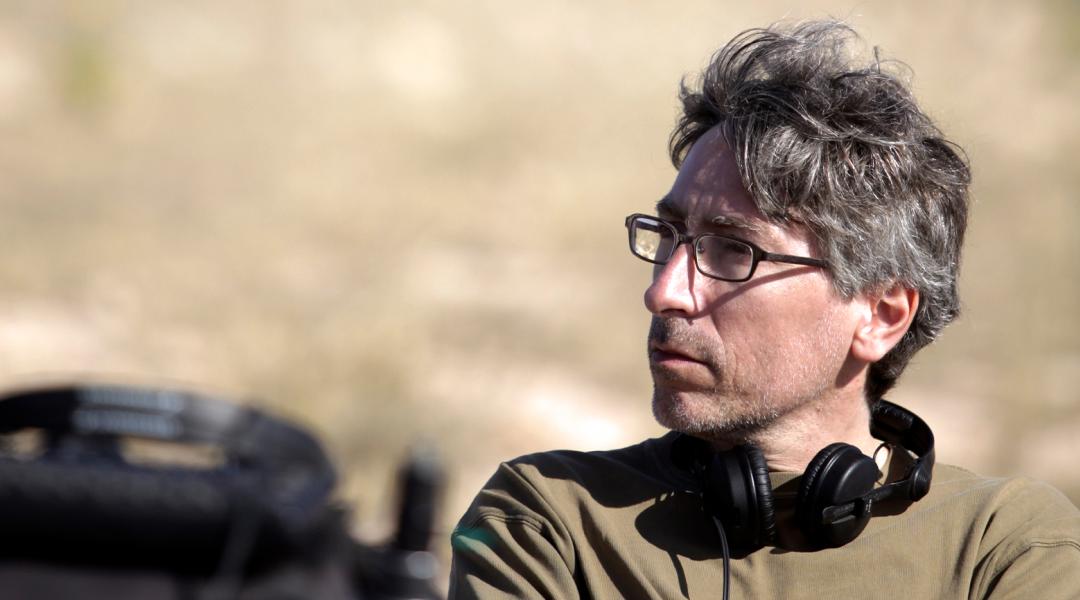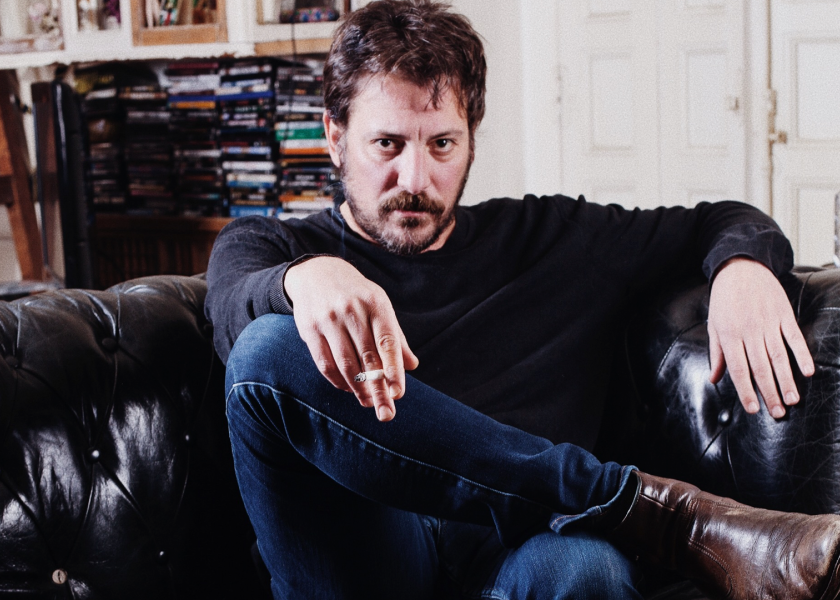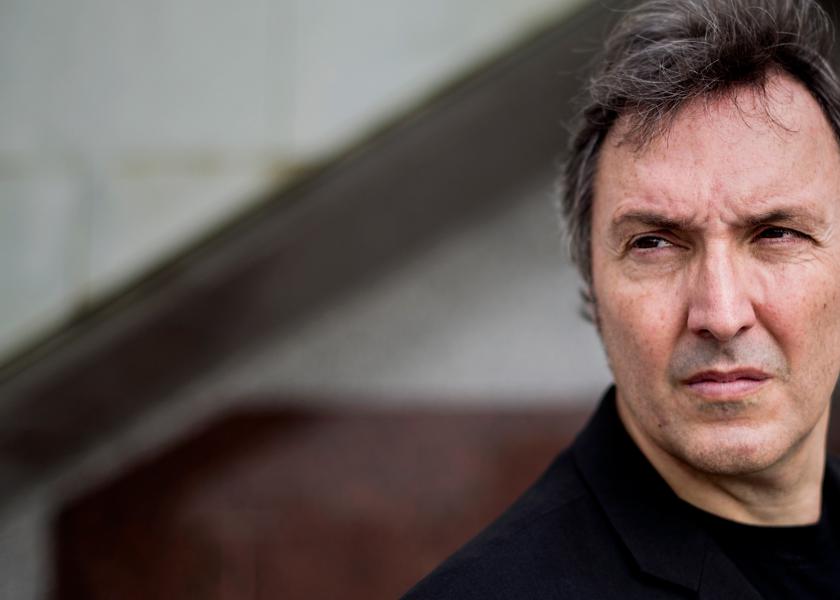David Trueba
The Creative Factory

Whenever David Trueba finishes writing a novel, shooting a movie or making a documentary, he is left with feelings of ambivalence. On the one hand, there is the satisfaction of a job finished and; on the other, the embarrassment of having to show his work. In order to neutralise those fears, when he is releasing or publishing something, he is usually already involved in a new project. We stole a few moments with him while he is immersed in the postproduction of his next film, 'A este lado del mundo'.
Trueba, the youngest in a large family of eight siblings, has just published El río baja sucio (Siruela), seemingly a youth novel but aimed at readers of all ages. He also premiered the documentary Si me borrara el viento lo que yo canto at the last San Sebastian Festival, centred on the figure of legendary singer-songwriter Chicho Sánchez Ferlosio. And to complete his trio of artistic aces, he has just finished postproduction of A este lado del mundo, a film shot in Melilla and slated for release in 2020. The big question is if it will rival the success of Living Is Easy with Eyes Closed, for which he won seven Goya awards, including the best film, best director and best original screenplay. With David Trueba, you never know.
Novelist, columnist, documentary filmmaker, screenwriter, director—you’re like a creative factory.
In spite of what many people believe, my three recent jobs have taken me years. Between the initial ideas and finishing the project, I go through many different phases, and some have to do with my mood. I usually abandon my projects for some time, then return to them and take it rather slow until I finish things.
Olga Tokarczuk, the Polish Nobel Prize winner, writes in Flights that “anyone who has ever tried to write a novel knows what an arduous task it is, undoubtedly one of the worst ways of occupying oneself.” Do you agree?
I’ve sometimes had the feeling that it’s voluntary slavery. A person very dear to me once asked me with complete sincerity if all that effort and dedication paid off. What pays off is the sensation of being able to finish it. That is a pleasure that’s bigger than the vain temptations of this line of work.
And what do you want with your novel El río baja sucio?
My only aim is to write the best possible novel; that it works, as a narrative; that it produces characters that leave a sensation that they exist and live on, even after you’ve finished reading the book. Managing that is like achieving the pleasure you experienced reading the best books in your life.
Is ecology now the great catalyst for youth mobilisation, as politics were in the 70s?I
I think kids realise that our relationship with all things organic is more relevant than the tech business or the urge to be famous or rich, and perhaps they want to rewrite humans’ relationship with the planet: instead of being devastating predators, we should be aware and rational.
Do you think younger readers will understand the deeper meaning of the novel?
When I was very young, and even today, many readings of the novels I devour escaped me. I don’t want the letters to be too underlined or marked; I prefer to suggest a direction and let the reader fill in the rest. A writer’s job is not to chew the reader’s food; it’s to make that dish rich, complex and enjoyable at the same time.
“A writer’s job is not to chew the reader’s food; it’s to make that dish rich, complex and enjoyable at the same time”
Did you have an adolescence filled with mountain holidays, rivers, bicycles and romance, like the characters in the novel?
Adolescence is only happy in memory. Like all young people, I suffered for things that, today, I feel are trivial. But I was free and independent; my parents were older, I was their eighth child and, therefore, they left me an enviable margin of freedom to be myself. They didn’t give me luxuries, but they did take me to rivers and mountains. As far as romance, I did a pretty good job of creating that myself.
Do you enjoy small sensory pleasures, like Gaspar, one of the adults in the novel?
I like watching the seasons go by. My kids think I’m crazy, because sometimes I celebrate the leaves sprouting in spring and yellowing in September. I also love sitting in a cinema and feeling how everything is turned off for the screen to light up. Silly things like that. And a good tomato and olive oil, of course.
You are one of publishing house Anagrama’s star writers. Does publishing El río baja sucio with Siruela mean anything?
My latest novel Tierra de Campos is still very much alive and continues to bring me joy and new readers. I didn’t want El rio baja sucio, which targets a somewhat different kind of reader, to eclipse it. Anagrama has been the home of my five novels. Next year will mark the 25th anniversary of the publication of my first, Abierto toda la noche. I don’t regret, not for a second, having published with them and staying true to them.
What can you tell us about A este lado del mundo?
I hope to have the movie ready by January 2020. Vito Sanz and Anna Alarcón play the main characters, and, and this is rare, I’m happy with it. I made it with a small but very experienced team. As always, I try to offer a vision of our time, but from an unusual perspective. The protagonist is a guy I can describe as follows: he was educated to build bridges and ended up building walls. I think that’s quite a good definition of the average citizen of our time.
What are the main advantages and disadvantages of shooting low-budget films in the margins of the industry?
It’s all disadvantages. I’m not stupid—I’d love to have five million euros to shoot my films, but without having to give up my ideas, cast and plots. When that’s not possible, between a lot of money and a lot of freedom, I choose the latter.
“When shooting movies, between having a lot of money and a lot of freedom, I choose the latter”
Would you say the common theme of your movies is love?
The common theme is survival. To survive life. It sounds paradoxical, but I think all readers will understand what I mean.
You have won a lot of Goya awards.
Yes, but before winning the first for Living Is Easy, I held the record of Goya nominations without ever winning one. I believe I had 13 screenwriting and directing nominations, and never got one. I was very fond of that record. It was a shame to give it up.
In 1982, your brother Fernando made a documentary about singer-songwriter Chicho Sánchez Ferlosio, Mientras el cuerpo aguante. Why did the story need the update you made with Si me borrara el viento lo que yo canto?
Because the story we tell, about his album recorded in secret by two Swedish students in 1963 and the adventures that followed, is a wonderful part of our country’s history, and a portrait of the longstanding tradition of Spanish nonconformism.
Is Spain a problem for you?
For every normal citizen, their country is a source of happiness and conflict. I love some things, I hate others. And from the sum of that comes the truth. What I try with my creations is to contribute more to the good things than to the bad ones.
At this point, what do you expect from your life?
Five things. If I say them out loud, I’ll jinx them.



